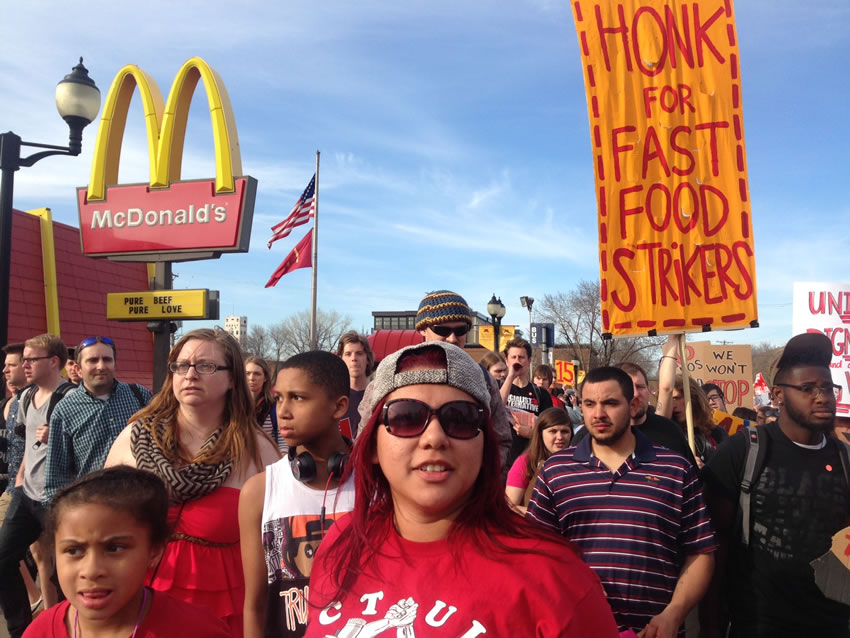

Share
At age 17, Keonna Laury attends high school – and works 33 hours a week at Burger King to help support her family of seven. Some nights she does not get home until after midnight, then must do her homework before arising early for school.
She earns $9.25 an hour and has no sick time or other benefits. When she came down with the flu, “They told me to come to work or get someone else to take my shift — or I was fired.”
On Wednesday, Laury was on the back of a pickup truck blocking the main intersection in the Dinkytown neighborhood of Minneapolis during the evening rush hour, telling her story to a huge crowd during a national day of protest.
The demonstrators, who had rallied on the University of Minnesota campus before marching to Dinkytown, chanted and carried signs calling for a $15-an-hour minimum wage and paid sick leave.
Local organizers said 87 fast food workers went on strike in the Twin Cities Wednesday. They were joined at the rally and march by hundreds of other fast food workers and supporters, including students and employees of the University, Walmart, Minneapolis-St. Paul International Airport and many others.
“This is our moment — we are going to change service jobs from ones that drag our economy down into ones that lift up workers, families and communities,” said Carmela Palacios, Burger King employee and member of CTUL, Centro de Trabajadores Unidos en la Lucha/Center of Workers United in Struggle.
“Fast-food workers are joining together and standing up for what’s right, and standing with so many people working in a variety of industries, we are stronger than ever. I know we will win.”
Nationwide, demonstrations were held in 237 cities, according to organizers for the “Fight for 15” movement. They said workers went on strike for the first time in Albany, New York; Asheville, North Carolina; Greenville, Mississippi; Montgomery, Alabama; and San Jose, California.
At many of the protests, calls for economic fairness mixed with demands for racial justice as ties between the Fight for $15 and the #BlackLivesMatter continued to deepen. A report released Monday by the National Employment Law Project showed that more than half of black workers in the United States are paid less than $15 an hour.
Demonstrations also were held in other countries. Workers occupied a McDonald’s in Glasgow, Scotland; stormed McDonald’s restaurants in five Brazilian cities and blockaded a McDonald’s in Paris, holding a six-meter long sign that read, “Stop Social Destruction and Tax Avoidance.”
In Dinkytown, 15Now organizer Ginger Jentzen told the crowd that all workers deserve a higher minimum wage.
“I’m part of a generation wracked with student debt,” she said. “I’m part of a generation going from minimum wage job to minimum wage job.”
The 15Now movement began in Seattle, where the city established a $15-an-hour minimum wage that has reduced poverty by 25 percent, Jentzen said. “We can do the same thing here in Minneapolis.”
In November, San Francisco became the second city in the U.S. to adopt a $15 minimum wage. Since the first fast-food strike in 2012, 9 million low-wage workers have gotten raises through local ballot measures, city and state legislation, contract negotiations and employer policy changes — more workers than are in private sector unions in the entire country.
“If we organize, working people are potentially the most powerful force in society,” said Jentzen.

